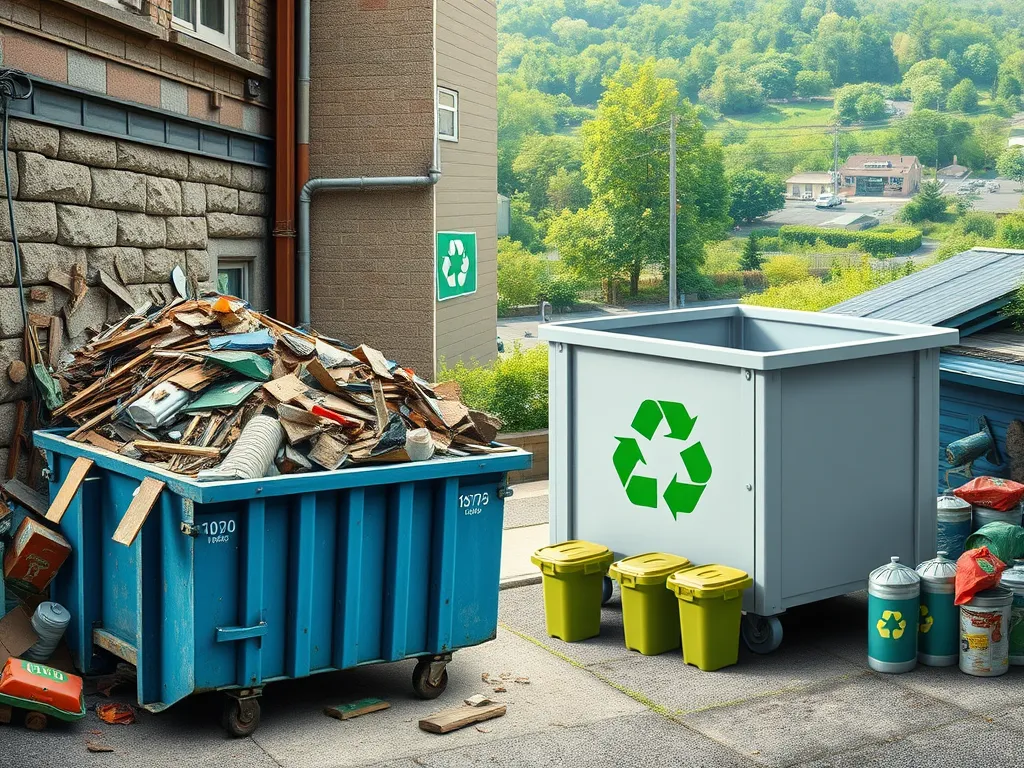Exploring the Dumpster Rental History: From Waste to Trends

The History of Dumpster Rental: An Evolution of Waste Management
The history of dumpster rental traces back to the early 20th century, a time when waste management was primarily dealt with by local municipalities with limited resources. As populations grew and urban areas expanded, the need for efficient waste disposal became critical. This led to the birth of the dumpster rental concept, which transformed how waste was managed and transported. The term 'dumpster' itself was coined in the 1930s, representing a pivotal change in the infrastructure of waste disposal.
The evolution of waste management practices can be traced back to ancient civilizations, as detailed on Wikipedia.
Initially, dumpsters were large metal containers that were placed at various locations to collect waste generated by construction sites, commercial businesses, and large residential buildings. These early dumpsters were not designed with the user-friendly features of today's models, but they laid the groundwork for a more organized waste management system. Thus, the dumpster rental history began with the need for businesses and contractors to manage their waste efficiently, leading to the establishment of rental services.
Throughout the decades, the role of dumpsters evolved alongside societal and regulatory changes, including the establishment of sanitation departments that began to standardize waste management practices. The rise in environmental awareness during the 1970s led to increased scrutiny of waste disposal methods and practices, influencing the dumpster rental industry to adopt more sustainable approaches and innovative designs.
In recent years, dumpster rentals have become increasingly accessible to the general public, catering to individual homeowners and DIY enthusiasts, further expanding the scope and significance of dumpster rental history. With technological advancements and a focus on environmental responsibility, the landscape of dumpster rentals is constantly evolving, showcasing the industry's resilience and adaptability to meet changing demands.
As we explore the various phases of dumpster rental history, from its origins to contemporary innovations, the narrative underscores the importance of waste management in societal progress and environmental preservation.
Origins of Dumpster Rental
The invention of the dumpster in 1935 by George Dempster marked a crucial milestone in the history of waste management. Dempster designed a metal container that could easily be lifted and dumped by a truck, which streamlined the collection process and made waste disposal more efficient compared to traditional methods of using wooden boxes or open pits. This innovation not only improved operational efficiency but also enhanced sanitary conditions by minimizing the exposure of waste to the environment.
The early uses of dumpster rentals primarily targeted large-scale projects such as construction and demolition sites. These rentals provided an efficient way to manage substantial waste quantities generated during such projects. Businesses began to adopt dumpster rentals prominently, as it relieved them from the cumbersome task of transporting their waste to disposal sites themselves.
Sanitation departments played a significant role in the dumpster rental history by regulating waste collection and implementing standards for waste disposal. As urban areas grew, municipalities established partnerships with dumpster rental companies to improve waste management services and ensure compliance with health and safety regulations, making dumpsters an essential component of public health initiatives.
Evolution Over the Decades
Over the decades, dumpster design and size underwent significant changes to cater to a wide variety of waste generation needs. From the original metal containers, the industry saw the introduction of various sizes and materials, including plastic and fiberglass, to accommodate different waste types. The ability to customize dumpster sizes allowed rental services to target specific markets, ranging from residential customers to large commercial enterprises.
Regulatory impacts on dumpster rentals also shaped the industry as legislation surrounding waste disposal tightened, particularly concerning hazardous materials. Compliance with environmental laws and regulations ensured that dumpster rental businesses adopted best practices for waste management, including recycling initiatives and proper disposal of hazardous waste, which heightened the importance of responsible rental services.
The transformation of rental services from local to national levels significantly expanded the accessibility of dumpster rentals for both consumers and businesses. The rise of franchising in the 1990s and 2000s allowed dumpster rental companies to establish standardized practices across regions, enhancing the consistency and reliability of services offered to customers, thus establishing dumpster rentals as a staple in waste management.
Cultural Impact of Dumpster Rentals
Dumpster rentals have found their place in popular culture, often depicted in movies, TV shows, and literature that highlight the humor and practicality of using dumpsters. This cultural representation has brought attention to their utility and has led to an increasing awareness of waste management issues within society.
Moreover, the rise of DIY projects and dumpster diving has contributed to the cultural impact of dumpster rentals. Individuals seeking to reduce waste and save money have turned to renting dumpsters for home renovations, cleanouts, and community clean-up days. In contrast, the art of dumpster diving has emerged as a popular movement, emphasizing resourcefulness and sustainability while promoting awareness about waste generation.
Environmental awareness surrounding waste disposal has prompted the dumpster rental industry to adapt and evolve to meet these societal expectations. As more consumers look for eco-friendly options, rental companies have incorporated sustainable practices into their services, emphasizing recycling and responsible waste management, reflecting a cultural shift towards more environmentally conscious behavior.
Modern Innovations in Dumpster Rental
Modern innovations in the dumpster rental industry include significant technological advancements in dumpster tracking and management. The implementation of GPS tracking systems allows rental companies to efficiently manage their inventory and provide real-time data to customers, improving service delivery and facilitating better communication between providers and users.
In response to increasing environmental concerns, the rise of eco-friendly dumpster rental options has revolutionized the industry. Many companies are now offering recycling programs, composting options, and alternative materials for dumpsters that minimize environmental impact, highlighting their commitment to sustainability.
The integration of rental services into broader waste management solutions has created a more cohesive approach to handling waste. Partnerships between dumpster rental companies and waste management organizations have enabled comprehensive strategies for waste reduction and responsible disposal, aligning with contemporary sustainability goals.
Future Trends in Dumpster Rentals
Looking to the future, the dumpster rental market is projected to continue evolving with the increase in urbanization and demographic shifts. This growth is expected to drive demand for rental services, as urban areas require efficient waste management solutions to handle population influx and rising waste generation.
Sustainability initiatives in waste disposal will play a crucial role in shaping the future of dumpster rentals. The industry's focus on reducing waste sent to landfills and promoting recycling and composting practices will likely become mainstream, influencing consumer behavior and expectations for rental services.
The impacts of urbanization on dumpster rental needs will emerge as a significant factor, compelling rental companies to adapt to the unique logistical challenges of urban environments. Innovations in service delivery, such as smaller, more accessible waste containers tailored to urban settings, will define the next wave of dumpster rental history, ensuring that the industry remains relevant and effective in managing waste for future generations.
